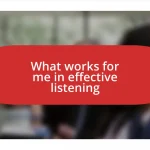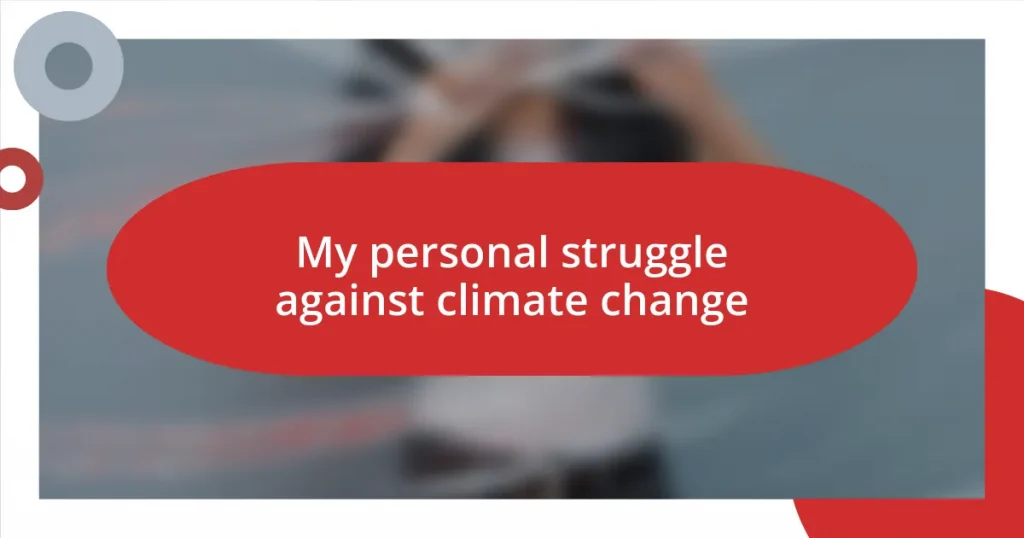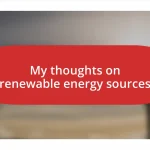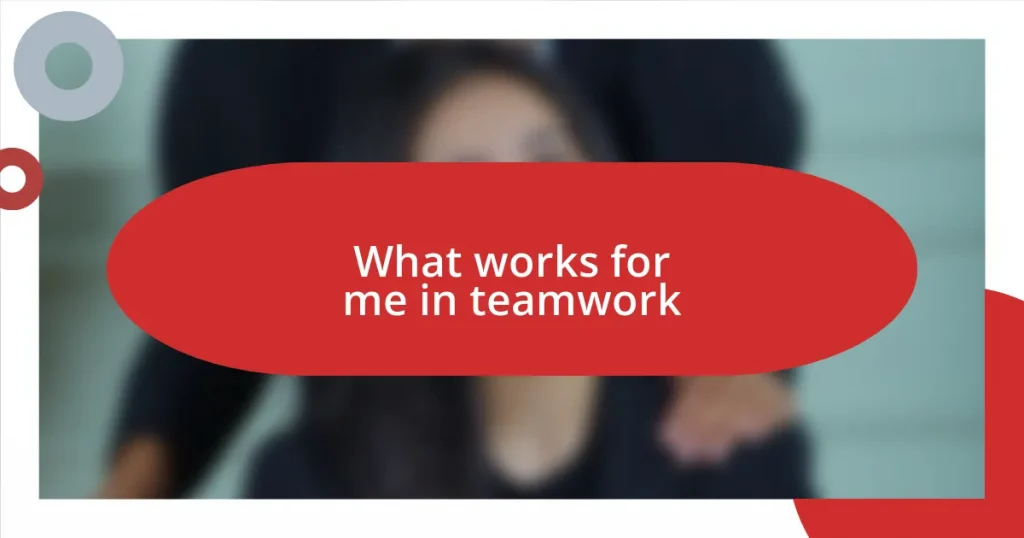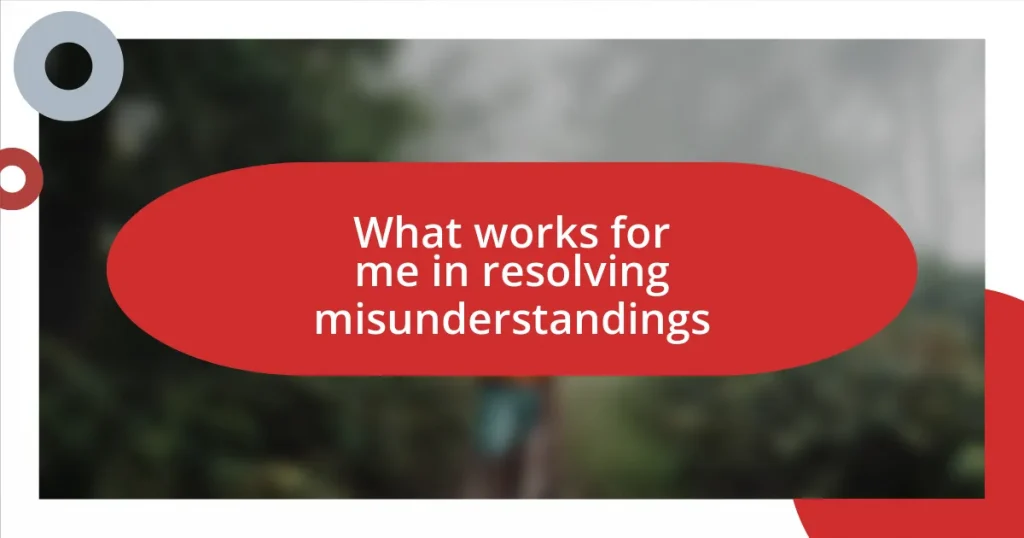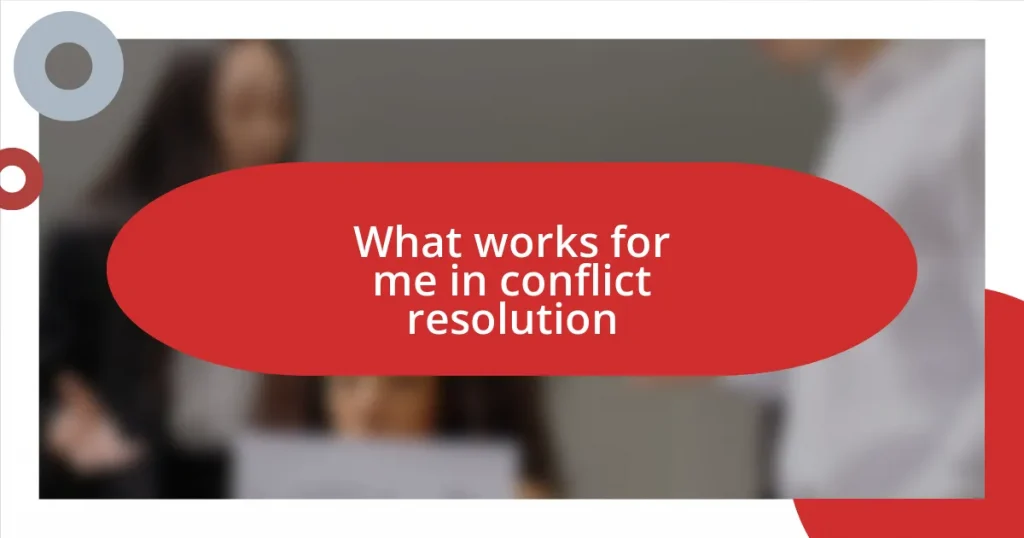Key takeaways:
- Recognizing personal responsibility is essential; small individual actions, like using reusable bags, can inspire community change.
- Implementing sustainable lifestyle changes, such as opting for public transportation and reducing meat consumption, contributes to lowering carbon footprints.
- Engaging in community actions fosters a sense of connection and collective responsibility, amplifying the impact of local environmental efforts.
- Advocating for policy change is crucial; collective voices and participation in meetings can influence environmental policy decisions.
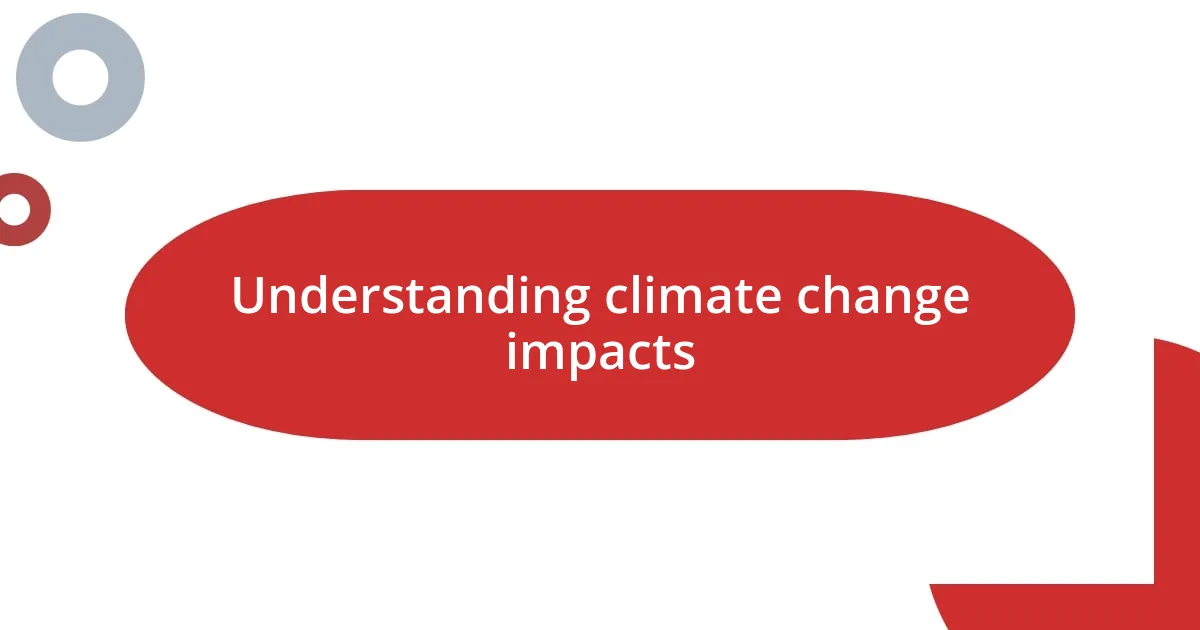
Understanding climate change impacts
As I reflect on my struggles against climate change, I can’t help but recall the time I stood on a beach, watching the waves crash higher than ever before. It struck me how rising sea levels, a direct consequence of climate change, threaten not just our coastlines but the homes of countless creatures—and people. Can you imagine the heartbreak of losing a lifelong home to water that wasn’t there just a generation ago?
I’ve also noticed how the seasons seem to shift dramatically, disrupting ecosystems around us. One summer, I planted my garden weeks earlier than usual, only to see my budding vegetables get scorched by an unexpected heatwave. This unpredictability is a result of climate change, which affects weather patterns and creates scenarios we can no longer anticipate. How can we adapt when nature herself is throwing us curveballs?
Moreover, the emotional weight of climate change often feels like a heavy blanket—one that presses down with both urgency and hopelessness. I’ve felt it during community meetings, where concern for future generations looms large in the room. The question remains: what legacy are we leaving behind? Understanding these impacts goes beyond statistics; it pierces the heart, urging us to act before it’s too late.
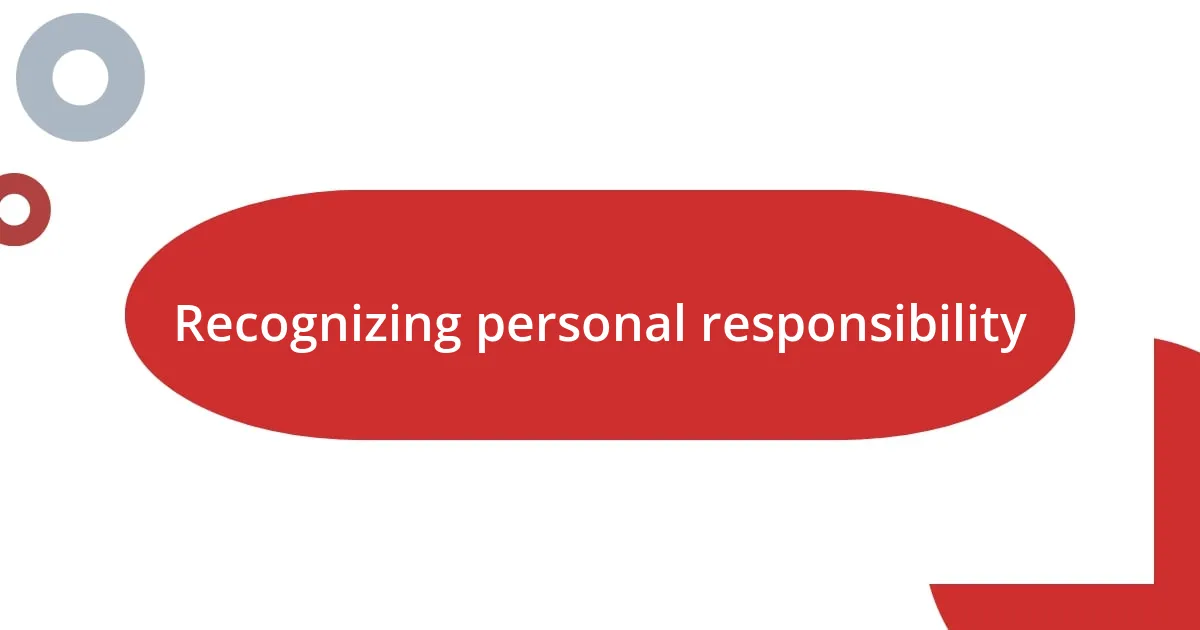
Recognizing personal responsibility
Recognizing personal responsibility is a crucial step in the ongoing battle against climate change. I remember the moment I realized that simply complaining about pollution wasn’t enough. One day, after witnessing a family of ducks struggling in a litter-filled pond, I knew I had to take action. I vowed to reduce my plastic use, not just for me, but for those innocent lives that deserve a cleaner environment.
When I started using reusable bags, it sparked conversations with friends and family. I shared stories about how much plastic waste I used to produce without thinking. This shift not only benefited the planet but also inspired those around me to reconsider their habits. Sometimes realizing our influence can be as simple as one conversation at a time. Have you ever thought about how your choices ripple through your community?
Moreover, I’m continually reminded of the collective nature of our responsibilities. I once joined a local clean-up event, and the camaraderie among volunteers was electrifying. It left me with a sense of purpose, knowing that my actions, though small, contribute to a larger goal. Each piece of trash we picked up represented a choice to safeguard our planet for future generations. Recognizing our personal responsibility can be daunting, but it’s empowering to know we’re part of a larger solution.
| Individual Actions | Community Impact |
|---|---|
| Using reusable bags | Inspiring others to reflect on their habits |
| Participating in local clean-ups | Creating a sense of communal purpose |
| Advocating for sustainable practices | Encouraging larger environmental movements |
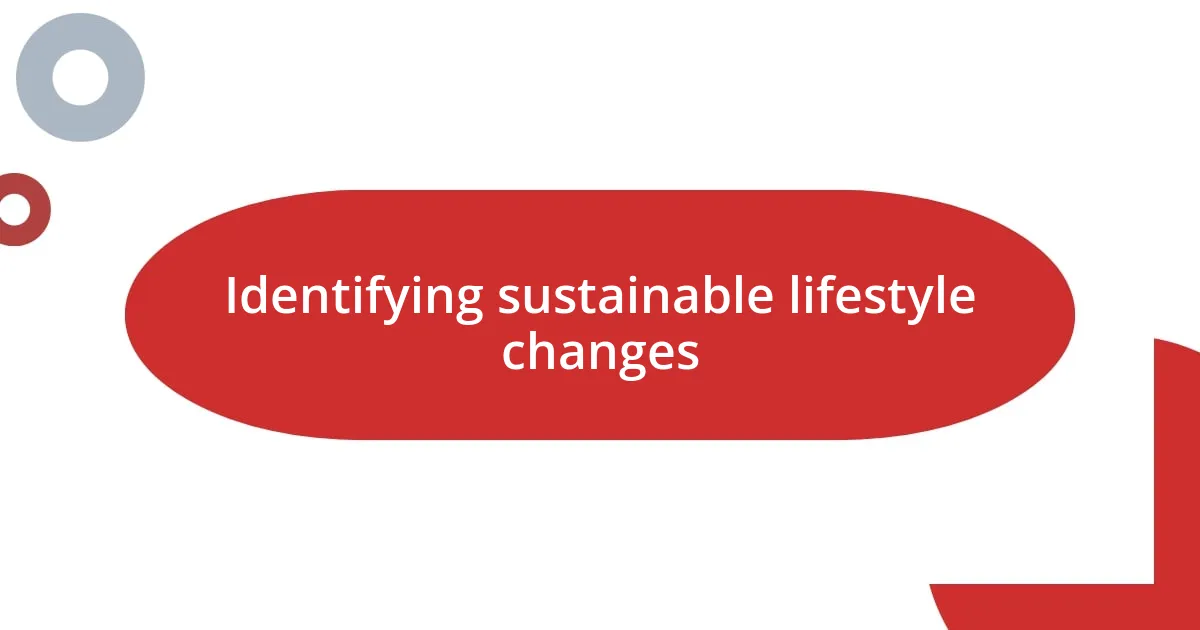
Identifying sustainable lifestyle changes
Identifying sustainable lifestyle changes is an impactful way to reduce our carbon footprint. I recall the day I swapped my everyday beef burger for a delicious plant-based alternative. It wasn’t just my taste buds that tingled; I felt a sense of accomplishment, knowing each small change contributes to lowering greenhouse gas emissions—a daunting but necessary challenge. Gradually, I began to embrace other lifestyle shifts that fit seamlessly into my routine.
Here are some specific actions that I’ve found effective:
- Opting for public transportation or biking: This not only cuts emissions but also adds a refreshing exercise component to my daily routine.
- Incorporating meatless meals into my week: This not only benefits the environment but also challenges my culinary creativity.
- Using energy-efficient appliances: Swapping out old models for energy-efficient ones has noticeably reduced my energy bills and environmental impact.
Making these changes felt overwhelming at first, but with each new step, I could feel the burden of climate change lifting just a bit.
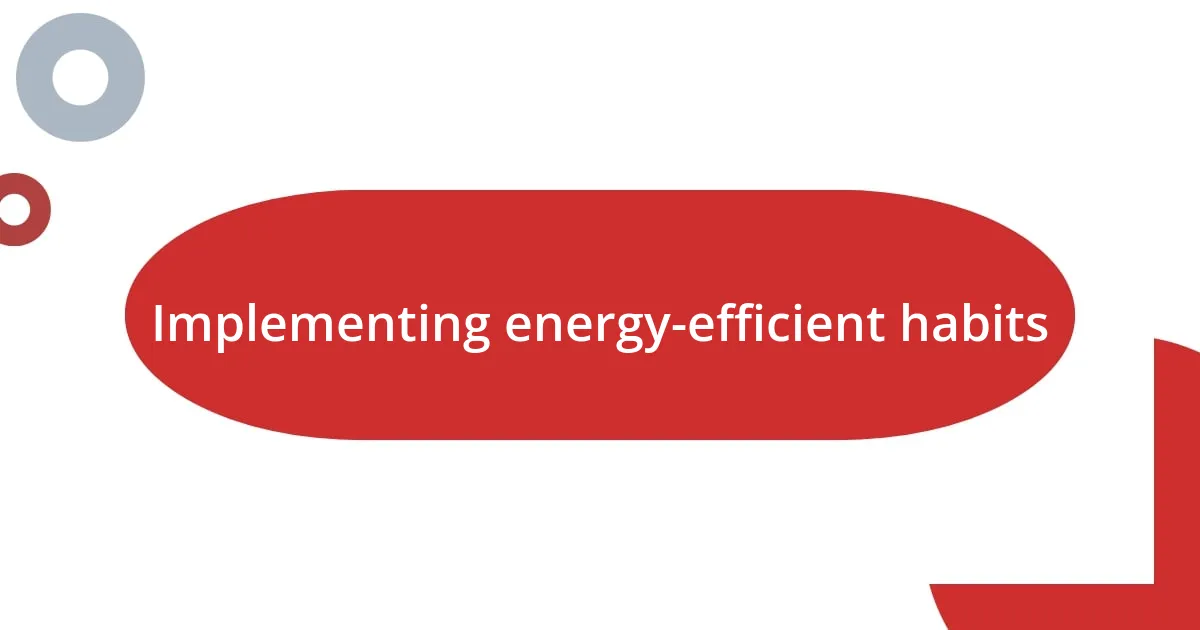
Implementing energy-efficient habits
Implementing energy-efficient habits has been a journey for me, often filled with surprising discoveries. I still vividly remember the day I decided to replace all the incandescent bulbs in my house with LED ones. It was like flipping a switch—literally and figuratively—on my understanding of energy usage. Not only did I notice a difference in my electricity bill, but it was also oddly satisfying to know I was using far less power while brightening my space.
Another habit that transformed my daily routine was unplugging devices when they weren’t in use. I had no idea how much phantom energy consumption was happening in my home. One evening, I made it a game: I walked through the house, looking for chargers, appliances, and lights that could be turned off. It felt liberating to take control, and I often ask myself, “Why didn’t I do this sooner?” I encourage you to try it—your mind might be set at ease when you see the immediate effects on your bills.
Lastly, I’ve made it a point to regularly maintain my heating and cooling systems. I remember the first time I scheduled a maintenance check; the technician revealed how a small filter change could improve efficiency dramatically. It was an eye-opener for me, realizing that simple acts of maintenance could save money and reduce energy consumption. Sometimes, I look back and wonder how much energy I wasted all those years of neglect. How many of us overlook such easy steps? It’s these small, consistent actions that build a more sustainable lifestyle.
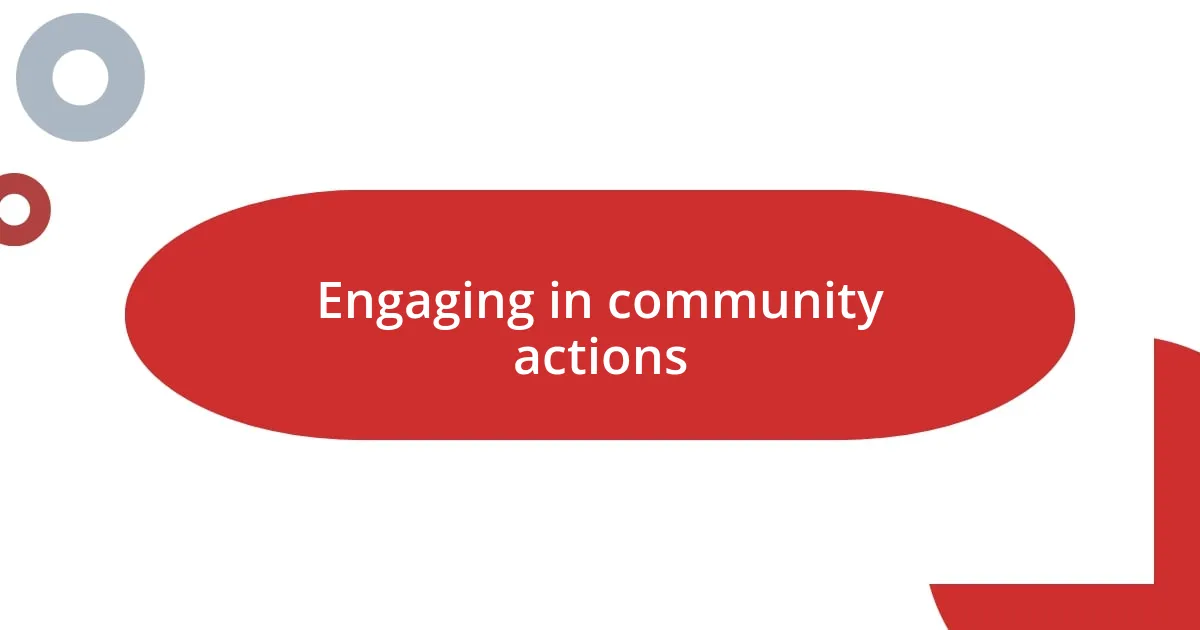
Engaging in community actions
Participating in community actions has opened my eyes to the power of collective effort against climate change. I remember one weekend when I joined a local cleanup at a nearby park. It was heartwarming to see families, students, and retirees come together with the same goal, all while sharing laughs and stories. That day, I realized that beyond picking up litter, we were fostering a sense of connection and responsibility toward our environment.
When I volunteered for a community tree-planting event, the experience was nothing short of transformative. As we dug into the soil, planting saplings alongside neighbors, I felt this overwhelming sense of hope. Each tree represented a commitment to combat climate change, and I couldn’t help but wonder how long it would take for our small efforts to grow into something monumental. Can you imagine the ripple effect of just a few hours of our time? It ignited my passion for encouraging others to get involved, turning our local community into a hub for environmental activism.
I’ve also taken part in organizing small workshops on sustainable practices, and those moments became some of my favorite interactions. Sharing knowledge about composting or gardening felt like passing on a legacy. One woman even approached me after a workshop, saying she didn’t realize her individual changes could inspire her children. That connection reminded me of the profound influence we can have on others. The simple act of engaging with my community has made the fight against climate change feel less isolating, reinforcing that we are all in this together.
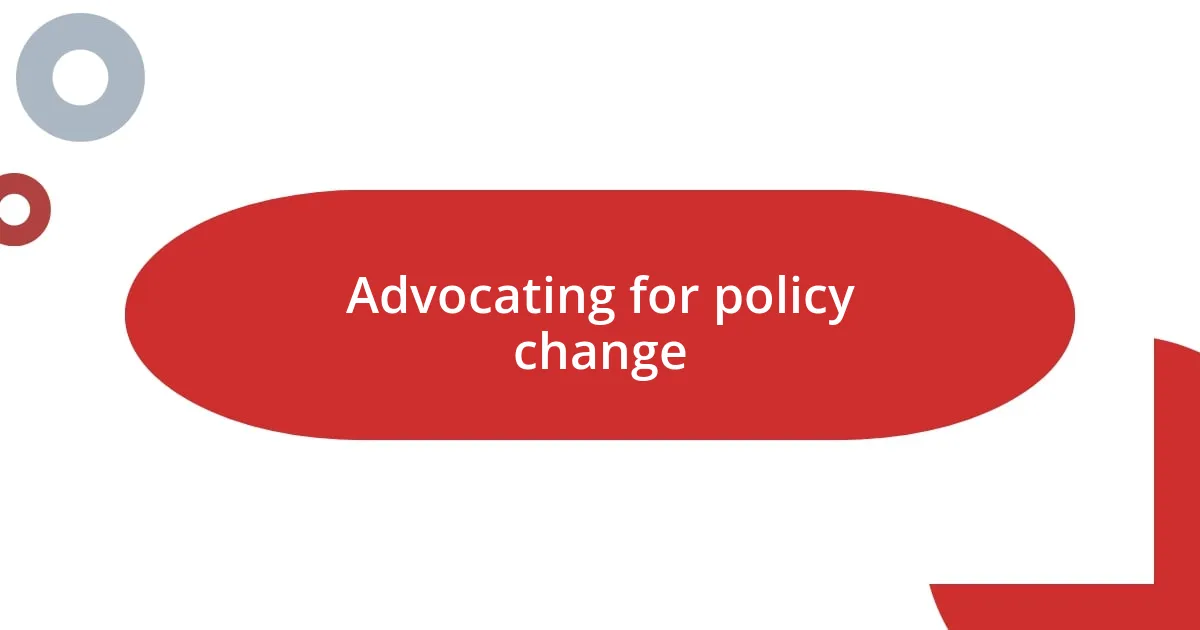
Advocating for policy change
Advocating for policy change has become an essential part of my journey. Early on, I remember attending my first town hall meeting, feeling a mix of excitement and nervousness. As I listened to residents passionately discuss environmental issues, I realized that my voice mattered too. It ignited in me a desire to speak up—not just for myself, but for future generations who deserve a stable climate. Isn’t that a compelling reason to get involved?
One memorable experience was when I rallied friends to join me in writing letters to our local representatives. The act of drafting those letters was a revelation. I poured my heart into expressing my concerns, and I could feel the weight of our shared responsibility. After sending them off, I felt an unexpected surge of empowerment. I couldn’t help but wonder: what impact could our collective voices have on policy if we all participated? Each letter was a small step towards making a bigger difference.
Through these advocacy efforts, I’ve learned that change is rarely instantaneous. I vividly recall the moment I discovered a proposed initiative to increase public transport funding. That realization prompted me to research, educate myself, and even attend meetings to lend my support. Witnessing the discussions and debates opened my eyes to the complexities of policy-making and the significant role each of us plays in shaping it. Have you ever realized how small actions can spiral into larger movements? Being part of this larger narrative, knowing that I’m contributing to meaningful change, gives me hope and motivation to keep pushing for the policies our planet needs.
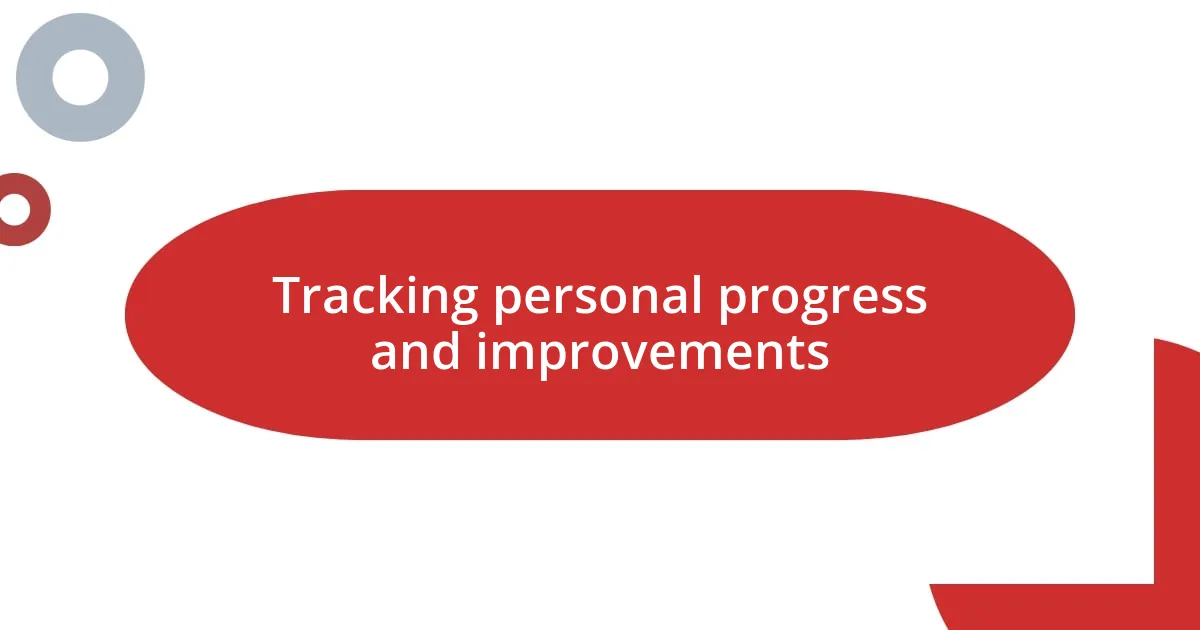
Tracking personal progress and improvements
Tracking my personal progress has been a revealing journey. I decided to keep a journal where I log my daily eco-friendly choices, from using reusable bags to opting for public transport. It was surprising to see how these seemingly small actions can accumulate; what started as a sporadic effort has transformed into a consistent routine that I genuinely enjoy. Isn’t it fascinating how tracking can motivate you to do even more?
To measure my impact, I also calculate my carbon footprint. Initially, it felt daunting, but I realized it served as a practical guide. I’ll never forget the day I calculated my reduction—it seemed remarkable to see the tangible results of my efforts in numbers. Each small victory, like reducing my energy consumption or making sustainable food choices, fueled my determination further. How else can we hold ourselves accountable if not through honest reflections?
Reflecting on my progress offers a powerful sense of empowerment. I’ve even created a visual chart displaying my improvements, including how many trees I’ve planted or the carbon emissions I’ve reduced. There’s a certain pride that comes from seeing that visual representation of my journey. It sparks conversations with others too. Have you ever thought about how sharing our progress can inspire those around us? I’ve found that it often opens the door for meaningful discussions about our shared responsibility toward the planet.



